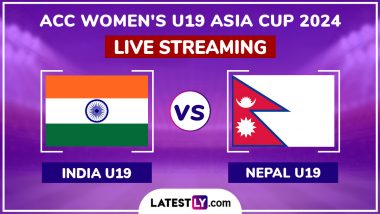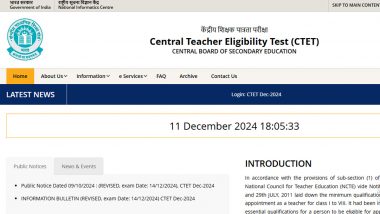New Delhi, July 30: The National Education Policy (NEP) 2020 that has been approved by the government on Wednesday would also see an overhaul of the system in place in higher education. The new NEP is believed to bring the focus back on education and learning. This is the first education policy of the 21st century and replaces the thirty-four year old National Policy on Education (NPE), 1986. It is aimed at bringing out the unique capabilities of each student. By 2030, the minimum degree qualification for teaching will be a 4-year integrated B.Ed. degree. The policy aims to achieve 100% youth and adult literacy. With the new policy in place, the education sector will now get 6% of GDP, Earlier it was 1.7%. New Education Policy 2020: From Major Reforms in School and Higher Education To Digital Push, All You Need to Know.
Take a Look at the National Education Policy 2020 FAQs
What Changes are made to the 10+2 schooling system in India?
The 10+2 structure of school curricula is to be replaced by a 5+3+3+4 curricular structure corresponding to ages 3-8, 8-11, 11-14, and 14-18 years respectively. It will include 12 years of schooling and three years of Anganwadi and pre-schooling. Under this change, the uncovered age group of 3-6 years will be brought under school curriculum.
The 3-6 years age-group kids have been recognized globally as the crucial stage for development of mental faculties of a child. The new system will have 12 years of schooling with three years of Anganwadi/ pre schooling. The NCERT will develop a National Curricular and Pedagogical Framework for Early Childhood Care and Education (NCPFECCE) for children up to the age of eight.
When Will National Education Policy 2020 be Implemented?
There is no official date as to when will the National Education Policy 2020 be Implemented in India. The new NEP will become operational as soon as it is notified by the government. According to the official website of the Ministry of Education, at present, the exercise of formulation of National Education Policy is ongoing and it will be finalised shortly.
What Changes Are Made in Grading System Under new NEP 2020?
All students will take school examinations in Grades 3, 5, and 8 which will be conducted by the appropriate authority. A National Book Promotion Policy is to be formulated.
What Changes Will be Made in Board Exams Patterns Under New NEP?
Board exams for Grades 10 and 12 will be continued, but redesigned with holistic development as the aim. A new National Assessment Centre, PARAKH (Performance Assessment, Review, and Analysis of Knowledge for Holistic Development), will be set up as a standard-setting body.
How Will Higher Education Change in India Under new NEP 2020:
NEP 2020 aims to increase the Gross Enrolment Ratio in higher education including vocational education from 26.3 per cent in 2018 to 50 per cent by 2035 and aims to add 3.5 crore new seats to higher education institutions.
Higher Education Commission of India(HECI) will be set up as a single overarching umbrella body for entire higher education, excluding medical and legal education. The public and private higher education institutions will be governed by the same set of norms for regulation, accreditation and academic standards.
What Changes Are Made to School Curricula and Pedagogy?
The school curricula and pedagogy will aim for holistic development of learner. The reduction in curricular content to enhance essential learning and critical thinking and greater focus on experiential learning. Students will have increased flexibility and choice of subjects. There will be no rigid separations between arts and sciences, between curricular and extra-curricular activities, between vocational and academic streams. Vocational education will start in schools from the 6th grade, and will include internships.
How will Multilingualism Help Students Under the new NEP 2020?
The policy has emphasized mother tongue/local language/regional language as the medium of instruction at least till Grade 5, but preferably till Grade 8 and beyond. Sanskrit to be offered at all levels of school and higher education as an option for students, including in the three-language formula. Other classical languages and literatures of India also to be available as options. No language will be imposed on any student.
Several foreign languages will also be offered at the secondary level. Indian Sign Language (ISL) will be standardized across the country, and National and State curriculum materials developed, for use by students with hearing impairment.
What Changes Have Been Made to undergraduate (UG) and Post-Graduate (PG) under NEP 2020?
Under the NEP, the changes made under the UG and PG stream is that multiple entry and exit options will be allowed. A student can complete UG in either 3 or 4 years, depending upon the career path that is chosen. For this, a Multidisciplinary Education and Research Universities or MERUs will be set up in or near each district.
What is the minimum qualification needed for a teacher under new NEP 2020?
The minimum qualification for teaching will be 4 year integrated B.Ed degree. A new and comprehensive National Curriculum Framework for Teacher Education, NCFTE 2021, will be formulated by the NCTE in consultation with NCERT. By 2030, the minimum degree qualification for teaching will be a 4-year integrated B.Ed. degree .Stringent action will be taken against substandard stand-alone Teacher Education Institutions (TEIs).
What changes have been made to Online Education and Digital Education under new NEP 2020?
A dedicated unit for the purpose of orchestrating the building of digital infrastructure, digital content and capacity building will be created in the MHRD to look after the e-education needs of both school and higher education. An autonomous body, the National Educational Technology Forum (NETF), will be created to provide a platform for the free exchange of ideas on the use of technology to enhance learning, assessment, planning, administration.
A new and comprehensive National Curricular Framework for School Education, NCFSE 2020-21, will be developed by the NCERT. NCERT will develop a National Curricular and Pedagogical Framework for Early Childhood Care and Education (NCPFECCE) for children up to the age of 8. Click here to see New NEP 2020 PPT.
The new National Education Policy (NEP) 2020 is built on the foundational pillars of Access, Equity, Quality, Affordability and Accountability. The new NEP is aligned to the 2030 Agenda for Sustainable Development and aims to transform India into a vibrant knowledge society. The aim of the new education policy is to make India a global knowledge superpower by making both school and college education more holistic, flexible and suited to 21st century needs.
(The above story first appeared on LatestLY on Jul 30, 2020 01:42 PM IST. For more news and updates on politics, world, sports, entertainment and lifestyle, log on to our website latestly.com).













 Quickly
Quickly





















